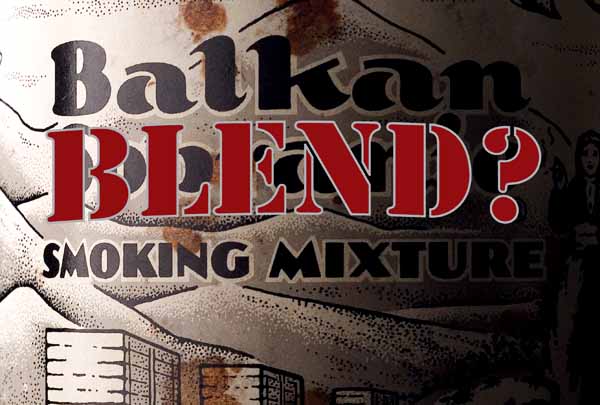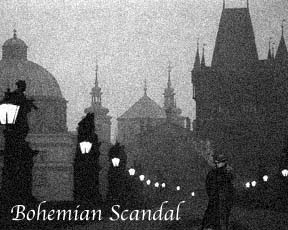What is a Balkan Blend?
14th April, 2011: Posted by glpease in Tobacco, Tobacco Commentary, Editorial
This article was originally published on 30th July, 2010, as my inaugural Out of the Ashes column for PipesMagazine.com. It is reprinted here with permission of the publisher. -glp

In the on-line pipe communities, there is often passionate conversation about the classification of blend types, and in these discussions, the most impenetrable clouds of mystery seem to swirl around those blends containing Latakia. What is an “English” mixture, and how can one be distinguished from a “Balkan” style blend? The problem is that both of these terms, despite broad usage, are somewhat ambiguous, at best, and, worse, the commonly held notions of what they mean is just plain backwards. And, yes, I’ll admit up front to being one of the early champions of this wrong-headedness. What? Read on.
It seems fairly clear that the term “Balkan” as a blend descriptor derives from the legendary Balkan Sobranie, and came into common usage as a way to describe tobaccos that are similar in character. That’s not really a problem, but, subsequent discussion of what this term might mean has led us down an entirely wrong path. A “Balkan” blend simply isn’t what it’s often said to be. Read more…»
A Tale of Two Latakias
4th January, 2011: Posted by glpease in Tobacco, Tobacco Commentary
Author’s Note:
This article was originally written for the now out of print Pipe Friendly Magazine, where it was published sometime in 1998, in Vol. 5 No. 2 of that magazine. I then republished it in the Articles section of the G.L. Pease website. I’m gradually moving those articles here where they can be searched, annotated, commented upon, and kept in a single archive. I figured this was a good one to start with.
A lot has happened since this originally appeared, including the loss, again, of Syrian Latakia, the subsequent “discovery” of some wonderful, vintage leaf, the creation of the almost legendary Bohemian Scandal, and then, my supply of that magnificent tobacco’s early demise in a tragic warehouse blaze. Today, there are a few tobaccos claiming to use Syrian Latakia, and fewer that actually do. I should probably make a major revision of this, and may in time, but for now, it is presented as originally written. As you read, please keep in mind that it was originally penned about 12 years ago, and much has changed!
—glp January, 2011

Introduction
For many years, Syrian Latakia has been virtually unobtainable. We’ve heard many lament the passing of this noble leaf, often accompanied by a feeling that if Syrian Latakia were still available, everything would suddenly be right in the world of tobacco. But, this delusion is certainly not limited to our Lady Nicotine. In our quest for the Arcadia Mixture of olde, we often seem to lose sight of the fact that things of the past often become more precious once they are no longer available to us. (This is one of the tragedies of art; an artist is rarely fully recognized, financially, for his or her talent until their death assures us that no more work will be produced, thus rendering priceless what was once merely acclaimed - or in some cases, just odd.)
In our collective mourning over the absence of the sacred Syrian, it becomes easy to take for granted what we do have. What about the fine leaf from Cyprus? With Syrian Latakia once again finding its way into our pipes, perhaps it is a good time to examine briefly the world of Latakia in general. Taking a little closer look at each type will offer us the opportunity to gain a new perspective on both varieties of this wonderfully smoky, noble weed.
Read more…»
Dunhill’s Ye Olde Signe
27th January, 2009: Posted by glpease in Tobacco Commentary
Thanks to the generosity of one of our pipe smoking brethren, I have been given the rare opportunity to taste this long out of production blend. I’ve found myself quite awestruck by it.
Ye Olde Signe was one of Dunhill’s earliest mixtures, first produced in 1915[1]. It is listed in early catalogues as, “Pure Virginia leaf, rich to natural sweetness, unusually mild with soft delicate flavour.”[2]. The sample I was given is ca. 20-years old, tinned by hand in the London store back when Dunhill still cared about tobaccos. It is a lovely dark, rich, shag-cut straight virginia blend, well matured, and rendered even more so by a couple decades in the tin. The bouquet is intoxicating, like any good, dark, well-aged virginia; softly fermented and inviting, with impressions of figs and sour Morello cherries (that’s actually a good thing), and minus the overly cased scent found in too many modern virginias. But what grabbed my attention and wouldn’t let go was the flavour. Read more…»
Search
Categories
- Cigars (2)
- Editorial (19)
- Enjoyment (10)
- Pipes (23)
- Product News (5)
- Review of the Day (8)
- Science (3)
- Stories (4)
- Technique (7)
- Tobacco (41)
- Tobacco Commentary (3)
Most Popular
in 'Tobacco Commentary'
Archives
- August 2019
- July 2019
- February 2019
- January 2019
- September 2012
- March 2012
- September 2011
- August 2011
- April 2011
- January 2011
- December 2010
- November 2010
- September 2010
- August 2010
- July 2010
- June 2010
- April 2010
- February 2010
- January 2010
- December 2009
- November 2009
- October 2009
- September 2009
- August 2009
- July 2009
- June 2009
- March 2009
- January 2009
- May 2008
- April 2008
- January 2008
- September 2007
- August 2007
- July 2007
- April 2007
- March 2007
- January 2007
- November 2006
- July 2006
- March 2006
- November 2005
- October 2005
- July 2005
- May 2005
- April 2005
- February 2005
- September 2004
- July 2004
- June 2004
- May 2004
- April 2004
- March 2004
- February 2004
- January 2004
- December 2003
- November 2003
- October 2003
